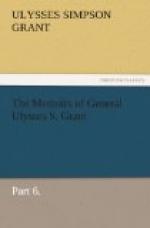Thomas was a valuable officer, who richly deserved, as he has received, the plaudits of his countrymen for the part he played in the great tragedy of 1861-5.
General Canby was an officer of great merit. He was naturally studious, and inclined to the law. There have been in the army but very few, if any, officers who took as much interest in reading and digesting every act of Congress and every regulation for the government of the army as he. His knowledge gained in this way made him a most valuable staff officer, a capacity in which almost all his army services were rendered up to the time of his being assigned to the Military Division of the Gulf. He was an exceedingly modest officer, though of great talent and learning. I presume his feelings when first called upon to command a large army against a fortified city, were somewhat like my own when marching a regiment against General Thomas Harris in Missouri in 1861. Neither of us would have felt the slightest trepidation in going into battle with some one else commanding. Had Canby been in other engagements afterwards, he would, I have no doubt, have advanced without any fear arising from a sense of the responsibility. He was afterwards killed in the lava beds of Southern Oregon, while in pursuit of the hostile Modoc Indians. His character was as pure as his talent and learning were great. His services were valuable during the war, but principally as a bureau officer. I have no idea that it was from choice that his services were rendered in an office, but because of his superior efficiency there.
CHAPTER LXX.
The end of the war—the march to Washington—one of Lincoln’s anecdotes —grand review at Washington—characteristics of Lincoln and Stanton —estimate of the different corps commanders.
Things began to quiet down, and as the certainty that there would be no more armed resistance became clearer, the troops in North Carolina and Virginia were ordered to march immediately to the capital, and go into camp there until mustered out. Suitable garrisons were left at the prominent places throughout the South to insure obedience to the laws that might be enacted for the government of the several States, and to insure security to the lives and property of all classes. I do not know how far this was necessary, but I deemed it necessary, at that time, that such a course should be pursued. I think now that these garrisons were continued after they ceased to be absolutely required; but it is not to be expected that such a rebellion as was fought between the sections from 1861 to 1865 could terminate without leaving many serious apprehensions in the mind of the people as to what should be done.




